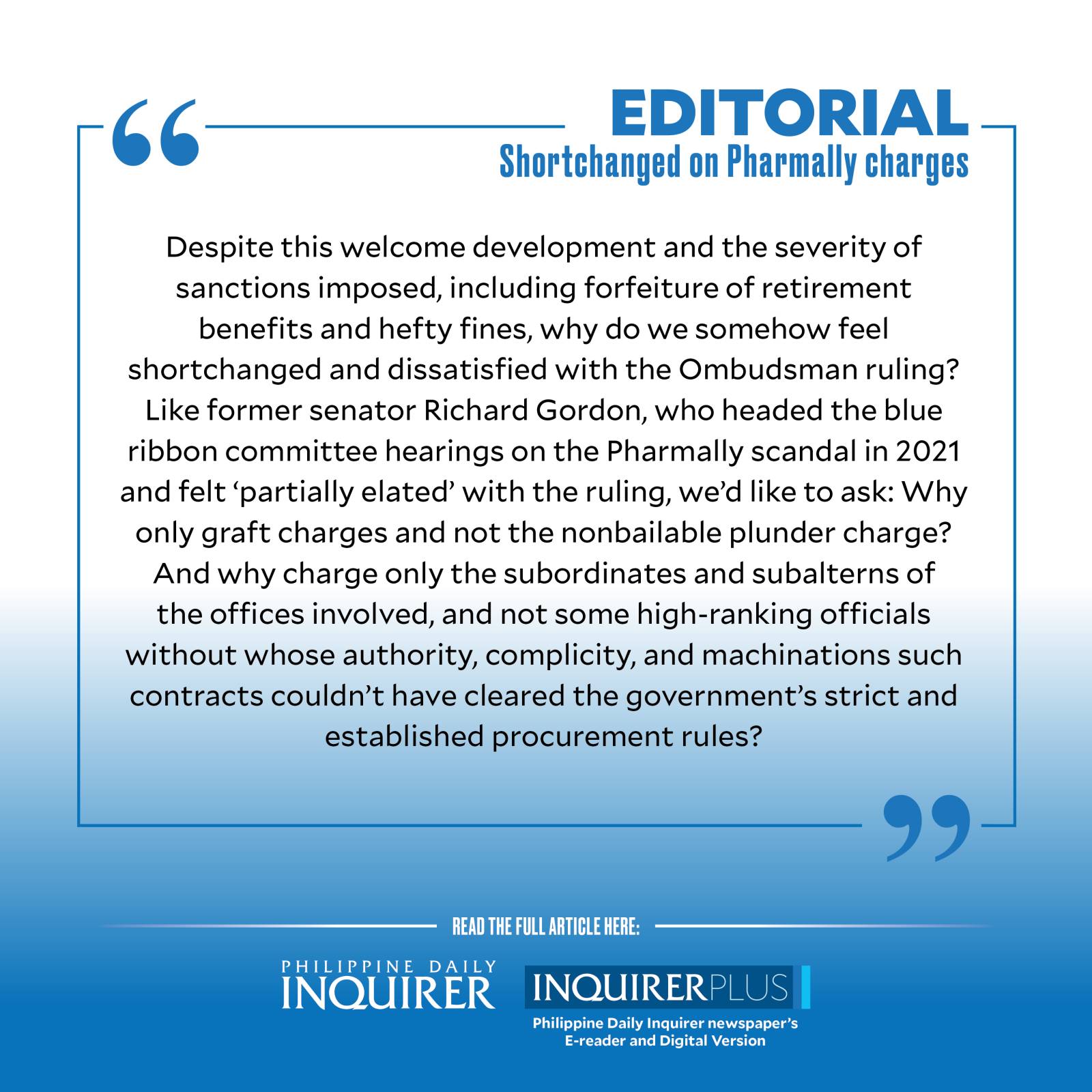Shortchanged on Pharmally charges
The Office of the Ombudsman resolution to recommend graft charges against several officials of the Procurement Service-Department of Budget and Management (PS-DBM) and the private trading firm Pharmally Pharmaceutical Corp. is the long-awaited “day of reckoning,” as Sen. Risa Hontiveros put it, that these individuals deserve for their “sickening” wastage and misuse of scarce government resources at the height of the COVID-19 crisis.
In a resolution announced last week, the Office of the Ombudsman approved the filing of three counts of graft against former PS-DBM Undersecretary Lloyd Christopher Lao, former procurement director and currently overall deputy ombudsman Warren Rex Liong, procurement management officer Paul Jasper de Guzman, and Pharmally officials Twinkle Dargani, Mohit Dargani, Linconn Ong, Justine Garado, and Huang Tzu Yen. Several PS-DBM officers, an employee, and a private respondent also face one count of graft.
Article continues after this advertisementThe ruling was welcomed by several senators as a “warning to those plotting to rob the coffers of government.” Along with the Ombudsman’s recent suspension of several top personnel of PS-DBM and the Department of Education for the overpriced laptop scam, the ruling was hailed as “a significant step” in seeking accountability for these officials’ betrayal of public trust.
The Ombudsman said the respondents, who will be charged, had conspired and connived with each other in awarding, “with manifest partiality and in bad faith,” billions of pesos worth of government contracts for medical supplies to a little-known firm with a capitalization of only P625,000. The face masks, RT-PCR kits, personal protective equipment, and face shields that Pharmally supplied turned out to be grossly overpriced and substandard in some cases. The respondents were thus guilty of grave misconduct, gross neglect of duty, serious dishonesty, and conduct prejudicial to the best interest of the service, the Ombudsman ruled in another resolution.
And yet, despite this welcome development and the severity of sanctions imposed, including forfeiture of retirement benefits and hefty fines, why do we somehow feel shortchanged and dissatisfied with the Ombudsman ruling?
Article continues after this advertisementLike former senator Richard Gordon, who headed the blue ribbon committee hearings on the Pharmally scandal in 2021 and felt “partially elated” with the ruling, we’d like to ask: Why only graft charges and not the nonbailable plunder charge? And why charge only the subordinates and subalterns of the offices involved, and not some high-ranking officials without whose authority, complicity, and machinations such contracts couldn’t have cleared the government’s strict and established procurement rules?
“Without exception, all [the] major players [in] this high crime should be charged as well,” Gordon said, naming Chinese national Michael Yang, who was appointed by former president Rodrigo Duterte as his special economic adviser in 2018, as among those overlooked in the charges to be filed.
Ombudsman Samuel Martires, however, countered that he cannot file cases against individuals based on testimonial evidence alone. “There should be concrete evidence.” As for the graft charge instead of plunder despite the amount involved breaching the P50-million threshold, he said: “We can’t file plunder since there is no evidence that Lao or Liong accumulated P50 million … ”
But can one expect a smoking gun in this shady deal that had Duterte himself issuing a gag order on government officials to keep them from attending the Senate hearings? Can one really believe that Lao and Warren Liong favored Pharmally out of the kindness of their hearts, maybe to give this grossly undercapitalized firm the break it needed? Given the huge amounts involved and the unseemly haste with which the anomalous contracts were approved and the supplies delivered, the more judicious and realistic question to ask is, what did those involved stand to gain from it? We might never see the money changing hands, but as the 2021 Senate hearings revealed, the Pharmally officials’ collection of luxury vehicles worth P52.9 million, despite the firm’s business losses the previous year, should indicate how awash in cash they had become because of the pandemic supply deal. And they’re just sideline players here, not the principal plotters. In the case of Lao and Liong, how much was at stake that was worth risking their name, career, and lifetime pension for?
As for the former president’s possible involvement, could a court trial have tweezered out answers to such questions as, why forbid officials from attending the Senate hearings that might have been instructive on how government procurement rules can be made stronger, more transparent, and graft-proof? And why justify the suspension of such rules using the Bayanihan to Heal As One Act when, as several senators had pointed out, it was not in effect yet when the Pharmally contract was signed? Without charges filed though, people can only speculate on the former president’s motives for such incriminating acts.
















